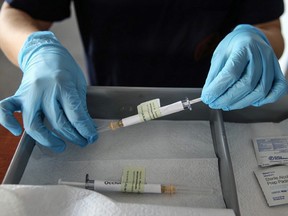Canada the biggest hoarder of COVID-19 vaccine pre-orders in First World, NGOs say
Dozens of poor nations could miss getting the COVID-19 vaccine next year because rich countries have hoarded far more than they need, the People's Vaccine Alliance says

Article content
Nine of 10 people in dozens of poor nations could miss out on getting vaccinated against COVID-19 next year because rich countries have hoarded far more doses than they need, campaigners said on Wednesday.
Rich nations home to 14% of the global population had bought 53% of the total stock of the most-promising vaccines as of last month, said the People’s Vaccine Alliance, a coalition including Oxfam, Amnesty International and Global Justice Now.
“Rich countries have enough doses to vaccinate everyone nearly three times over,” said Mohga Kamal-Yanni, an advisor for People’s Vaccine Alliance, “whilst poor countries don’t even have enough to even reach health workers and people at risk.
“The current system, where pharmaceutical corporations use government funding for research, retain exclusive rights and keep their technology secret to boost profits, could cost many lives.”

The campaigners used data from science information and analytics company Airfinity to analyze the deals done between countries and eight leading vaccine candidates, including China’s Sinovac and Russia’s Sputnik V.
Of the countries to buy up more than their fair share of coronavirus shots, Canada tops the chart having secured 8.9 doses per head, the equivalent of enough vaccines to vaccinate each citizen five times over.
“Canada has done exactly what we would expect a high-income country to do, and they’ve done the right thing by their country,” Andrea Taylor at the Duke Global Health Innovation Center told Nature.
The U.S. is in close second having secured 7.3 doses per head – enough to vaccine every American nearly four times – and the UK’s deals will result in 5.7 doses per head, which is enough to vaccinate everyone in the country almost three times.
In addition to Canada, the U.S. and U.K., the European Union, Japan, Switzerland, Australia, Hong Kong, Macau, New Zealand, Israel and Kuwait have acquired 53% of potential doses.
As a result, the centre in Durham, North Carolina, has estimated, many people in low-income countries might have to wait until 2023 or 2024 for vaccination.
“Unless something changes dramatically, billions of people around the world will not receive a safe and effective vaccine for Covid-19 for years to come,” said Anna Marriott, Oxfam’s health policy manager.
The alliance said pharmaceutical companies working on COVID-19 vaccines should openly share their technology and intellectual property through the World Health Organization (WHO) so more doses can be manufactured.
It urged governments to support South Africa and India’s proposal to the World Trade Organization Council this week to waive intellectual property rights for COVID-19 vaccines, tests and treatments until everyone is protected.
While high-risk groups in Britain received on Tuesday the first shot of the vaccine developed by Pfizer and BioNTech, most people in 67 low- and lower middle-income countries including Bhutan, Ethiopia and Haiti, risk being left behind, they said.
Among the three COVID-19 vaccines for which efficacy results have been announced, almost all the available doses of two of them – Moderna and Pfizer/BioNTech – have been acquired by rich countries, the Alliance report said.
While AstraZeneca and the University of Oxford have pledged to provide 64% of their doses to people in developing nations, that would only reach 18% of the world’s population by next year “at most,” it added.
“By buying up the vast majority of the world’s vaccine supply, rich countries are in breach of their human rights obligations,” Steve Cockburn, Amnesty International’s Head of Economic and Social Justice, said in a statement.
With files from the London Daily Telegraph
Our website is the place for the latest breaking news, exclusive scoops, longreads and provocative commentary. Please bookmark nationalpost.com and sign up for our daily newsletter, Posted, here.











Postmedia is committed to maintaining a lively but civil forum for discussion. Please keep comments relevant and respectful. Comments may take up to an hour to appear on the site. You will receive an email if there is a reply to your comment, an update to a thread you follow or if a user you follow comments. Visit our Community Guidelines for more information.